
You Lost Your Temper With Your Child: How to Make Things Better Again
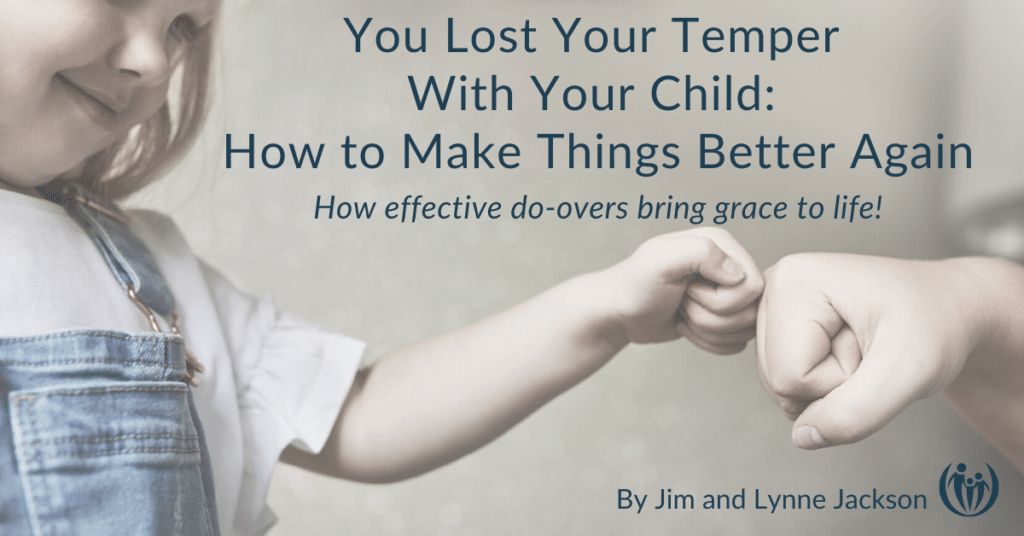
You lost your temper with your child or teenager. We’ve all been there. We’ve all messed up as a parent. We’ve let our anger or frustration get the best of us. We yell when we want to be calm. We say things we wish we hadn’t. We set consequences that really don’t fit the situation. We worry that our mistakes will hurt our kids. We get discouraged that those mistakes often linger with our kids and even become bitterness or resentment.
And then we linger in bad thoughts about ourselves, like, “I just can’t do this!” or, “I’m so stuck!” or even, “I’ll try harder next time!” These thoughts can leave us feeling ashamed of our parenting – which tends to lead to more discouraged parenting.
Lose the shame of losing your temper with your child
You are not alone. Mistakes reveal our humanity. We’re bound to make them. You’re bound to sometimes lose your temper with your child. What we do after we make a mistake may be every bit as important as getting it right in the first place. Maybe even more. And you can do it!
Here is an important truth: Your humility when you lose your temper and blow it is valuable currency for influence in your kids’ lives.
In our early days of parenting we discovered a recipe for making “lemonade” of wisdom out of our “lemons” of parenting mistakes. The recipe is flavored with a big dose of God’s grace and humility, mixed with repentance, forgiveness, and a second chance by humbly doing a “do-over!”
3 tips to giving yourself a do-over after you lose your temper
1) Stand firm in God’s mercy and compassion.
Research shows that when people stay stuck in shame-filled self-criticism about a hurtful behavior, they are more likely to repeat the same behavior! In short: it’s shame that keeps us stuck.
So how do you release yourself from the tenacious grip of shame? Self-compassion seems to be the current answer in psychology these days. Since the self-compassion movement began to gain momentum early in the millennium, there have been dozens of books published with those words in the title, even Self-Compassion for Dummies (ummm… does that seem like a bit of an oxymoron?) 😉
But the most effective way to defeat shame and self-criticism isn’t to muster your own self-compassion, which can change with your mood or even whether you got a good night’s sleep last night! It’s to stand firm in the truth of God’s compassion and mercy for you, anchored in the historical event of Christ’s death and resurrection.
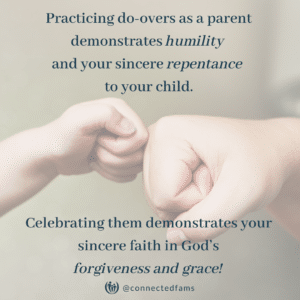
But beware that there is an enemy that wants to keep you stuck in shame. “Satan’s stance toward us is lying accusation—he makes global negative assessments drawn from our shortcomings and perceived inadequacies… we need to counter this with a stance of godly self-compassion.”
When God’s mercy breaks through in the midst of heated emotions and harsh responses, it can be transforming. Lynne shares the story of her “aha moment” about God’s mercy in a messy conflict in this post.
2) Walk out your repentance with a do-over.
It’s important to reject shame about who we are as a parent. But what leads us to healthy repentance after we’ve messed up as a parent is Godly guilt, together with God’s kindness, about what we’ve done. Repentance is a gift—it is the change of mind and change in direction when we’ve blown it that restores relationships.
(For an article about the difference between shame and guilt, click here.)
When we sense God’s love and compassion for us in those tough times, it empowers us to repent, change our behavior during that messy moment, and try again. And the more we do, the more it changes our habits. This practical discipline tool can have such a powerful impact on brain pathways over time, we sometimes refer to the “Brain Magic of Do-overs!”
Think of your old, harsh, default responses (actually brain pathways) like ruts in a road. The more you travel the road, the more familiar it gets and the deeper and wider the ruts become. Soon it’s normal to travel down that well-worn road quickly, and it’s difficult to get out of those deep ruts.
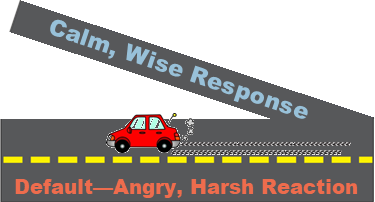
How? Tip: Don’t relive the bad moment. Back up and do it right.
Those harsh words are on the top of your brain and the tip of your tongue. But afterward, you will actually be more likely to do the same thing again next time, if your default is to say something like this:
- “I need to be more patient,”
- “Shoot, I blew it again, I’ll try harder next time,”
- “I can’t do this anymore. I’ll never get it right!”
You’ve now re-lived your mistake in your mind and felt ashamed about it. This will actually broaden and deepen the ruts!
The key to making new ruts in the road, that can lead to the “exit ramp” of calm, wise responses, is to immediately STOP, and BACK UP. Then, slowly drive onto the exit ramp by doing a DO-OVER.
Practically speaking it might go like this: “Hey, I didn’t like how I acted. I’m sorry. Can I try again?” Take a deep breath and say a short prayer as you calmly sit down, or even physically back up and start over. Then redo your response with an awareness of God’s grace and love for all of you.
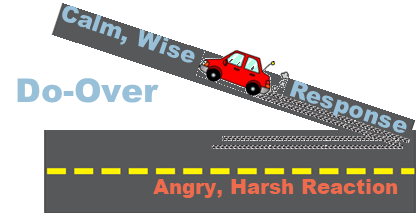
3) Celebrate how much better that felt!
An important principle about the brain and behavior is that you get more of whatever you focus on. It’s why God has blessed us with the wonderful command in Philippians 4:8 to focus on whatever is true, noble, or right… anything excellent or praiseworthy. Celebrating a do-over is the “secret sauce” that makes this concept so powerful and transforming.
Instead of dwelling on what went wrong in the conflict, and how you messed up as a parent, give your biggest and best energy to describing the benefit of your new response. You might even try some high-fives, fist bumps, or big smiles.
Celebrating a do-over is the “secret sauce” that makes this concept so powerful and transforming.
Celebrating a do-over might look like:
- “Now that’s more like how I want to respond!”
- “That felt better to me when I did it that way. Did that feel better to you?”
- “I’m so thankful that God has so much grace for us when we blow it!”
It’s not always easy to celebrate a do-over when you’ve just blown it big time. But even in your worst parenting moments, your repentance is guaranteed in scripture to bring full forgiveness from God through Jesus! Then any guilt or shame should be gone, done, vanquished, conquered. If you find those feelings lingering, you might even need to get angry at the lie (or the Liar) with some righteous anger if you need to!
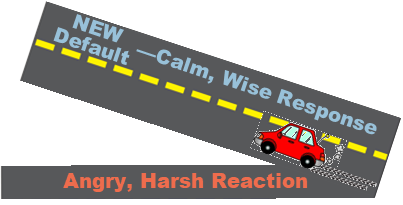
Why is celebrating a do-over after we mess up so important?
Am I not “being the parent” if I do a do-over? Is this really that important? Here are some reasons why doing and celebrating do-overs are vitally important as a parent:
- Do-overs are a guilt-reliever and a shame-buster for you.
- They demonstrate your sincere repentance to your child.
- They model humility as you lead your family with grace.
- Physically experiencing a better response to your child (not just hoping for it) is the most effective way to carve new “ruts in the road” of your brain. It will likely be the catalyst to change those habits you really want to change.
- If you don’t model do-overs, and just try to make kids do them, for example: “That was not ok! You need to do a do-over right now!” (visualize furrowed brow) your child will perceive them as a shame-filled punishment, instead of a grace-filled invitation to restore a relationship and learn a better way.
- If it’s clear that we feel better after doing our do-overs, it’s natural that kids will want in on the joy of doing their own at some point. Then you’ll know their do-overs are heartfelt and sincere instead of imposed.
- Your kids will blow it a lot in life. Seeing do-overs modeled and celebrated is the first step in kids eventually learning to do them. This helps them protect their most important relationships.
- Most important of all: Celebrating your do-overs is a powerful demonstration of your faith in the fullness of God’s forgiveness and mercy. (Even the best Sunday School lesson doesn’t touch it.)
If we confess our sins, He is faithful and just and will forgive us our sins and purify us from all unrighteousness. 1 John 1:9
How one mom changed her habits, starting with do-overs
Making a new habit of modeling and celebrating grace-filled do-overs has been at the heart of many families’ journey of transformation. God’s grace in our messy, sinful conflicts gives us the power to change.
Do not conform to the pattern of this world, but be transformed by the renewing of your mind. Romans 12:2
Michelle, mom of five, shared her experience with this principle.
“In the beginning, my do-overs were numerous times a day. As I continued to practice self-awareness, repenting, apologizing, and trying again, I started to notice that sometimes I would stop myself right in the middle of an immature interaction and try again. Then, one day, I realized my do-overs were getting less and my wisdom-filled responses started becoming more of who I was… God has been using my continually trusting Him in the midst of my own misbehavior to change my heart over time.”
We’ve made a PDF download for you to print up with practical tips to get you started. Seeing it on your refrigerator or bulletin board will be a helpful reminder to practice this great tool.
Raising kids is probably the biggest challenge of your life and you will mess up as a parent – a lot! But do-overs help forge new roads of grace, forgiveness, and practical skills.
Ready to dive in and learn more about the Framework?
Our 8-session online course, Discipline That Connects With Your Child’s Heart will guide you through each level of the Framework. If you’re looking for a grace-filled way to parent, this course is for you!

